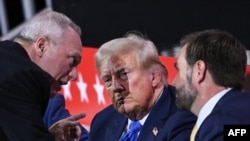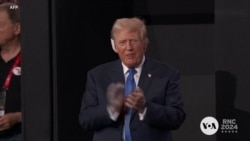Immigration took center stage as the Republican National Convention resumed Tuesday, with speakers spotlighting a key element of former President Donald Trump's political brand that helped endear him to the GOP base when he began his first campaign in 2015.
Among speakers slated for Tuesday night were families who've been impacted by violent crime — part of a GOP strategy to link crime to border policies. They include the family of Rachel Morin, a Maryland woman whom prosecutors say was killed and raped by a fugitive from El Salvador and whose story has been frequently highlighted by Trump on the campaign trail.
Immigration has long been one of Trump's banner issues, as he has criticized the unprecedented number of migrants entering the country illegally through the U.S. border with Mexico. The numbers of unauthorized crossings have fallen abruptly after President Joe Biden issued a rule suspending many asylum claims at the border.
At rallies and other campaign events, Trump has pointed to examples of migrants who committed heinous crimes and has blamed migration for the trafficking of drugs like fentanyl, even though federal data suggests many people smuggling fentanyl across the border are U.S. citizens. He has vowed to carry out the largest deportation operation in U.S. history.
Trump's anti-immigrant rhetoric has also strayed into talking points not backed by evidence, including unfounded claims that migrants are entering the country to vote in the 2024 election.
Rep. Steve Scalise of Louisiana, the House majority leader, made that statement in his remarks, declaring, "Biden and Harris want illegals to vote now that they've opened up the border."
Senate candidates who were addressing the convention Tuesday not only blamed Biden for the number of migrants crossing the border, but just as often faulted Vice President Kamala Harris, whom Republicans have increasingly focused on amid speculation that she could replace Biden as the Democratic nominee after the president's poor debate performance.
The GOP candidates, mindful of their own races, sought to blame their Democratic opponents as well. Pennsylvania candidate David McCormick, for example, tied in his challenger, Sen. Bob Casey, with the term "Biden-Harris-Casey wide open borders."
Kari Lake, the party's Senate candidate in Arizona, stuck to a message that appealed largely to the GOP base and her reputation as a former television news anchor turned conservative firebrand. She blasted the "fake news" for spending "the last eight years lying about President Donald Trump and his amazing patriotic supporters." She also blamed Biden and Democrats for the situation on the U.S.-Mexico border, saying they're "full of bad ideas."
In the latest signal the party is solidifying to take on Biden in November, several of Trump's fiercest GOP primary rivals will also speak Tuesday. They include former South Carolina Gov. Nikki Haley, Florida Gov. Ron DeSantis and biotech entrepreneur Vivek Ramaswamy.
Trump's survival of an attempted assassination Saturday at a rally in Pennsylvania was on the minds of many inside the hall. One of the delegates in the crowd could be seen with a folded white piece of paper over his ear — an apparent tribute to the bandage Trump wore when he entered the hall Monday to a roaring crowd.
Scalise, who was injured in a politically motivated shooting in 2017 while he was practicing for a charity baseball game, spoke of his own experience when he touched on Trump's attack.
"While I was fighting for my life, Donald Trump was one of the first to come to console my family at the hospital. That's the kind of leader he is. Courageous under fire, compassionate towards others," Scalise said.
In the wake of Saturday's attempt on Trump's life, there was a heightened focus on security at the convention, which drew thousands of people to downtown Milwaukee, including a number of high-profile elected officials.
A man armed with an AK-47 pistol and wearing a ski mask was taken into custody Monday, the convention's first day, near the Fiserv Forum where the convention is being held, a federal law enforcement official said Tuesday.
The 21-year-old was arrested after being encountered by U.S. Capitol Police and Homeland Security Investigations agents who said he was acting suspicious, according to the official, who was not authorized to publicly discuss details of the ongoing investigation and spoke to The Associated Press on condition of anonymity.
Police found the weapon in his backpack, the official said.
On Tuesday, five Ohio police officers who were in Wisconsin for the convention shot a man who was in a knife fight near the convention, killing him, Milwaukee's police chief said.
The man who police shot had a knife in each hand and refused police commands, Milwaukee Chief Jeffrey Norman said at a news conference. Two knives were recovered from the scene, the chief said.
Trump and Vance were expected to appear in the hall each of the last three nights of the convention. Vance will speak Wednesday and Trump will speak Thursday.
Pennsylvania Republican Party Chairman Lawrence Tabas said he hoped the assassination attempt on Trump would reset the tone nationally, beginning with Trump's scheduled remarks Thursday.
"After a brush with death, I do believe — going through that — that his message will be better, and I think will appeal to our better emotions," Tabas said in an interview after the Pennsylvania GOP's delegation breakfast in suburban Milwaukee.
Trump, who has long decried rivals with harsh language and talked about prosecuting opponents if he wins a second term, seemed poised to deliver a more toned-down speech. His eldest son, Donald Trump Jr., said in an Axios interview outside the RNC that he spent three or four hours going through his father's convention speech with him, "trying to de-escalate some of that rhetoric."
"I think it lasts," the younger Trump said of the change in his father's rhetoric. "There are events that change you for a couple minutes, and there are events that change you permanently."






